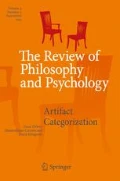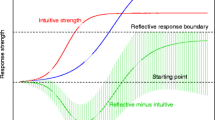Abstract
Moral psychologists have shown that people’s past moral experiences can affect their subsequent moral decisions. One prominent finding in this line of research is that when people make a judgment about the Trolley dilemma after considering the Footbridge dilemma, they are significantly less likely to decide it is acceptable to redirect a train to save five people. Additionally, this ordering effect is asymmetrical, as making a judgment about the Trolley dilemma has little to no effect on people’s judgments about the Footbridge dilemma. We argue that this asymmetry is the result of a difference in how each dilemma affects people’s beliefs about the importance of saving lives. In two experiments, we show that considering the Footbridge dilemma disconfirms these beliefs, while considering the Trolley dilemma does not significantly affect them. Consistent with predictions of sequential learning models, our findings offer a clear and parsimonious account of the asymmetry in the ordering effect.


Similar content being viewed by others
Notes
In the Trolley dilemma, participants are told they are at the wheel of a runaway train that will cause the deaths of five workmen if it proceeds on its present course. The only way to avoid the deaths of these workmen is to hit a switch, redirecting the train to a side track where it will kill a single workman instead. This dilemma is often contrasted with another famous moral dilemma, the Footbridge dilemma, which asks participants to consider a situation in which they are on a footbridge, in between a runaway trolley and five workmen who will be killed if nothing is done. Participants are then told that the only way to save the lives of the five workmen is to push a stranger off the bridge and onto the tracks below where his large body will stop the trolley.
Another possible explanation is that some beliefs influence participants’ judgments about the Footbridge dilemma but are not recruited when making a judgment about the Trolley dilemma. For instance, making a judgment about the Trolley dilemma might recruit a set of beliefs S 1 , S 2 , and S 3 , whereas making a judgment about the Footbridge dilemma recruits shared beliefs S 1 , S 2 , and S 3 , along with additional beliefs S 4 , S 5 , and S 6 . This means it is possible that consideration of the Footbridge dilemma affects all of the beliefs recruited when making judgments about the Trolley dilemma, but that consideration of the Trolley dilemma only affects some subset of the beliefs recruited when making judgments about the Footbridge dilemma. If this were right, then people’s judgments about the Trolley dilemma would have a weaker effect on people’s judgments about the Footbridge dilemma than vice versa.
References
Danks, D., T.L. Griffiths, and J.B. Tenenbaum. 2003. Dynamical causal learning. In Advances in neural information processing systems, ed. S. Becker, S. Thrun, and K. Obermayer, 67–74. Cambridge, Mass: The MIT Press.
Greene, J.D., R.B. Sommerville, L.E. Nystrom, J.M. Darley, and J.D. Cohen. 2001. An fMRI investigation of emotional engagement in moral judgment. Science 293(5537): 2105–2108.
Hogarth, R.M., and H.J. Einhorn. 1992. Order effects in belief updating: The belief-adjustment model. Cognitive Psychology 24(1): 1–55.
Liao, S. M., A. Wiegmann, J. Alexander, and G. Vong. 2011. Putting the trolley in order: Experimental philosophy and the loop case. Philosophical Psychology :1–11.
Lombrozo, T. 2009. The role of moral commitments in moral judgment. Cognitive Science 33(2): 273–286.
Moore, M. 1997. Placing blame: A general theory of the criminal law. Oxford: Oxford University Press.
Moore, M. 2012. Ethics in extremis: Targeted killings and the morality of targeted killings. In Targeted killing: Law and morality in an asymmetrical world, ed. C. Finkelstein, J. Ohlin, and A. Altman. Oxford: Oxford University Press.
Prinz, J. 2007. The emotional construction of morals. Oxford University Press.
Rai, T.S., and K.J. Holyoak. 2010. Moral principles or consumer preferences? Alternative framings of the Trolley problem. Cognitive Science 34(2): 311–321.
Rescorla, R.A., and A.R. Wagner. 1972. A theory of Pavlovian conditioning: Variations in the effectiveness of reinforcement and nonreinforcement. In Classical conditioning II, ed. A.H. Black and W.F. Prokasy, 64–99. New York: Appleton.
Schwitzgebel, E., and F. Cushman. 2012. Expertise in moral reasoning? Order effects on moral judgment in professional philosophers and non-philosophers. Mind & Language.
Shanks, D. 1985. Forward and backward blocking in human contingency judgment. The Quarterly Journal of Experimental Psychology Section B: Comparative and Physiological Psychology 37(1): 1–21.
Sinnott-Armstrong, W. 2008. Framing moral intuitions. In Moral psychology volume 2 the cognitive science of morality intuition and diversity, ed. W. Sinnott-Armstrong, pp. 47–76. MIT Press.
Tobia, K. et al. (2012). Moral Intuitions: Are Philosophers Experts?. Philosophical Psychology :1-10.
Van Hamme, L.J., and E.A. Wasserman. 1994. Cue competition in causality judgments: The role of nonpresentation of compound stimulus elements. Learning and Motivation 25: 127–151.
Waldmann, M. R., J. Nagel, and A. Wiegmann. 2012. Moral Judgment. In The Oxford handbook of thinking and reasoning, eds. K. J. Holyoak, R. G. Morrison, 1–68.
Wiegmann, A., and Y. Okan. 2012. Order effects in moral judgment: Searching for an Explanation. Proceedings of the Thirty-Fourth Annual Conference of the Cognitive Science Society. Sapporo, Japan.
Wiegmann, A., J. Nagel, and S. Mangold. (2008). Order effects in moral judgment. Philosophical Psychology (March):2111–2116.
Acknowledgments
We would like to thank the two anonymous referees at Review of Philosophy and Psychology, Keith Holyoak, John Hummel, Jonathan Waskan, and Tage Rai.
Author information
Authors and Affiliations
Corresponding author
Rights and permissions
About this article
Cite this article
Horne, Z., Powell, D. & Spino, J. Belief Updating in Moral Dilemmas. Rev.Phil.Psych. 4, 705–714 (2013). https://doi.org/10.1007/s13164-013-0159-y
Published:
Issue Date:
DOI: https://doi.org/10.1007/s13164-013-0159-y




